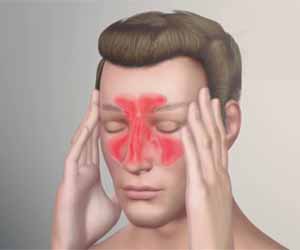- Home
- Editorial
- News
- Practice Guidelines
- Anesthesiology Guidelines
- Cancer Guidelines
- Cardiac Sciences Guidelines
- Critical Care Guidelines
- Dentistry Guidelines
- Dermatology Guidelines
- Diabetes and Endo Guidelines
- Diagnostics Guidelines
- ENT Guidelines
- Featured Practice Guidelines
- Gastroenterology Guidelines
- Geriatrics Guidelines
- Medicine Guidelines
- Nephrology Guidelines
- Neurosciences Guidelines
- Obs and Gynae Guidelines
- Ophthalmology Guidelines
- Orthopaedics Guidelines
- Paediatrics Guidelines
- Psychiatry Guidelines
- Pulmonology Guidelines
- Radiology Guidelines
- Surgery Guidelines
- Urology Guidelines
Dupilumab may benefit patients of severe chronic rhinosinusitis with nasal polyps: Lancet

Delhi: Dupilumab addition to daily standard of care is beneficial for patients with severe chronic rhinosinusitis with nasal polyps (CRSwNP) who otherwise have few therapeutic options, a recent study published in The Lancet journal has found.
According to the study, dupilumab was well tolerated, reduced polyp size, sinus opacification, and severity of symptoms in patients with severe CRSwNP.
Dupilumab is a fully human monoclonal antibody that inhibits signalling of interleukin (IL)-4 and IL-13, key drivers of type 2 inflammation, and has been approved for use in atopic dermatitis and asthma.
CRSwNP patients generally have a high symptom burden and poor health-related life quality. They often require recurring systemic corticosteroid use and repeated sinus surgery.
In LIBERTY NP SINUS-24 and LIBERTY NP SINUS-52 trials Claus Bachert, Ghent University, Ghent, Belgium, and colleagues aimed to assess efficacy and safety of dupilumab in patients with CRSwNP despite previous treatment with systemic corticosteroids, surgery, or both.
SINUS-24 and SINUS-52 were multinational, multicentre, randomised, double-blind, placebo-controlled, parallel-group studies. Eligible patients in the two studies were 18 years or older with bilateral CRSwNP and symptoms despite intranasal corticosteroid use, receiving systemic corticosteroids in the preceding 2 years, or having had sinonasal surgery.
Between Dec 5, 2016, and Aug 3, 2017, 276 patients were enrolled in SINUS-24, with 143 in the dupilumab group and 133 in the placebo group receiving at least one study drug dose. Between Nov 28, 2016, and Aug 28, 2017, 448 patients were enrolled in SINUS-52, with 150 receiving at least one dose of dupilumab every 2 weeks, 145 receiving at least one dose of dupilumab every 2 weeks for 24 weeks and every 4 weeks until week 52, and 153 receiving at least one dose of placebo.
SINUS-24 was done in 67 centres in 13 countries wherein patients (n=276) were randomly assigned in the ratio 1:1 to receive subcutaneous dupilumab 300 mg (n=143) or placebo (n=133) every 2 weeks for 24 weeks.
SINUS-52 was done in 117 centres in 14 countries wherein the patients (n=448) were randomly assigned (1:1:1) to dupilumab 300 mg every 2 weeks for 52 weeks (n=150), dupilumab every 2 weeks for 24 weeks (n=145) and then every 4 weeks for the remaining 28 weeks, or placebo every 2 weeks for 52 weeks (n=153).
All patients were randomly assigned centrally with a permuted block randomisation schedule. Randomization was stratified by asthma or non-steroidal anti-inflammatory drug-exacerbated respiratory disease status at screening, previous surgery at screening, and country. Patients with or without comorbid asthma were included. Coprimary endpoints were changes from baseline to week 24 in nasal polyp score (NPS), nasal congestion or obstruction, and sinus Lund-Mackay CT scores (a co-primary endpoint in Japan), done in an intention-to-treat population.
Safety was assessed in a pooled population of both dupilumab groups in SINUS-52 up to week 24 and the dupilumab group in SINUS-24 and the placebo groups in both studies until week 24.
Also Read: FDA approves dupilumab for chronic rhinosinusitis with nasal polyps in adults
Key findings of the study include:
- Dupilumab significantly improved the coprimary endpoints in both studies.
- At 24 weeks, least-squares mean difference in NPS of dupilumab treatment versus placebo was −2·06 in SINUS-24 and −1·80 in SINUS-52; the difference in nasal congestion or obstruction score was −0·89 in SINUS-24 and −0·87 in SINUS-52, and difference in Lund-Mackay CT scores were −7·44 in SINUS-24 and −5·13 in SINUS-52.
- The most common adverse events (nasopharyngitis, worsening of nasal polyps and asthma, headache, epistaxis, and injection-site erythema) were more frequent with placebo.
Also Read: Addition of budesonide to saline solution beneficial in rhinosinusitis : JAMA
"These results support the benefits of adding dupilumab to the daily standard of care for patients with severe CRSwNP who otherwise have few therapeutic options," concluded the authors.
To read the complete study log on to https://doi.org/10.1016/S0140-6736(19)31881-1

Disclaimer: This site is primarily intended for healthcare professionals. Any content/information on this website does not replace the advice of medical and/or health professionals and should not be construed as medical/diagnostic advice/endorsement or prescription. Use of this site is subject to our terms of use, privacy policy, advertisement policy. © 2020 Minerva Medical Treatment Pvt Ltd